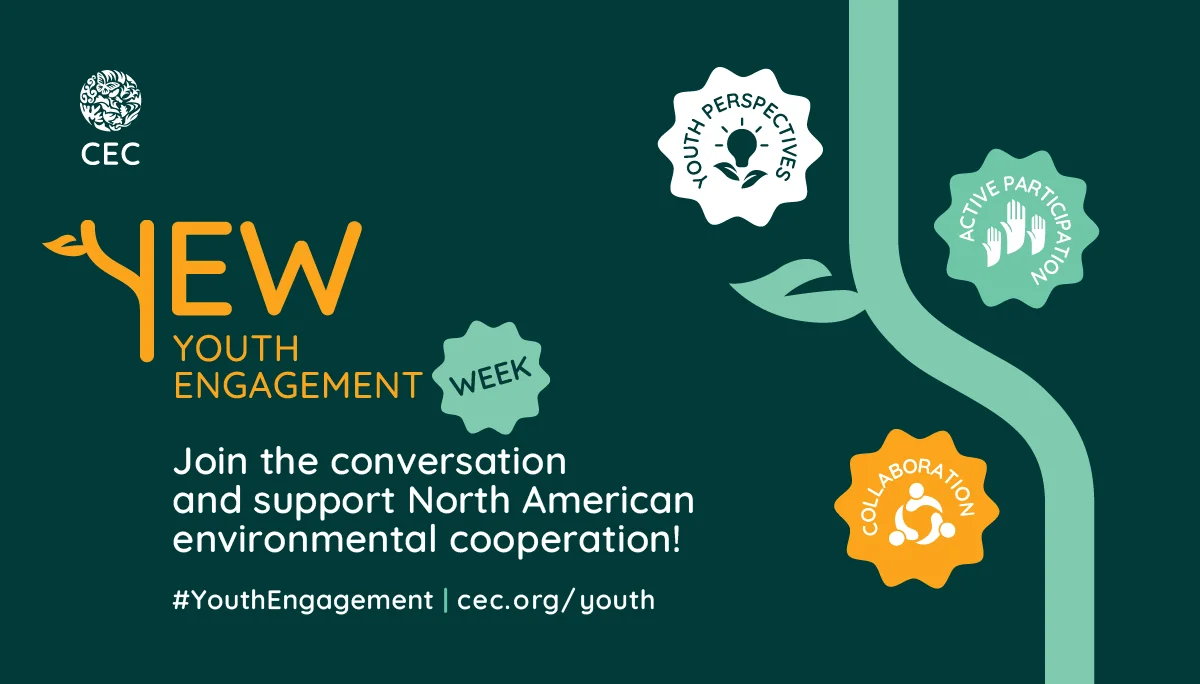2025 Youth Engagement Week – Call for Speakers and Facilitators Now Open!
Calling all youth leaders in Canada, Mexico and the United States! The 2025 Youth Engagement Week (YEW) is taking place online this fall, and the CEC is looking for speakers and facilitators. If you believe in intergenerational networks and the vital role of youth perspectives to build a sustainable future in North America, then this opportunity might be for you!
Youth Breaking Silos
This year’s theme, “Youth Breaking Silos,” celebrates the intersectional expertise of youth and their role in shaping sustainable futures in North America. The YEW will feature a series of three webinars, each highlighting youth-led initiatives and the organizations that collaborate with and support them. These online webinars will provide a platform for dialogue, knowledge sharing and collaborative learning across borders and generations.
- Webinar 1: Youth-Driven Businesses and Intra/Entrepreneurship
- Webinar 2: Youth & Indigenous and Traditional Ecological Knowledge
- Webinar 3: Youth & Subnational and Community Resilience Engagement
Become a 2025 YEW Facilitator
The CEC is seeking three youth facilitators—one from each country—to collaborate in the design, development and delivery of the webinars. Facilitators will each lead one webinar, coordinate with speakers and support the development of a best practices summary.
Check out the eligibility criteria and apply here to become a 2025 YEW Facilitator. But hurry! This opportunity closes on 30 September 2025, at 11:59 p.m. (your local time).
Become a 2025 YEW Speaker
The CEC is also inviting youth and representatives from organizations that engage, collaborate with and support youth-led initiatives to speak during one of the webinars. Speakers will share their experiences and insights related to intra/entrepreneurship, Indigenous and Traditional Ecological Knowledge or subnational and community resilience engagement. Selected speakers will collaborate with facilitators, participate in preparatory meetings and engage actively during the webinars.
Check out the eligibility criteria and apply here to become a 2025 YEW Speaker before 16 October 2025, at 11:59 p.m. (your local time).
Contribute to the North American environmental conversation
The YEW is an annual event designed to embrace youth perspectives in North America by fostering their active participation in the CEC's work and efforts. Whether you are applying to be a facilitator, a speaker, or joining as a participant, the CEC Youth Engagement Week will offer a unique opportunity to contribute to a trinational conversation on environmental leadership. It is a chance to share your expertise, connect with peers across borders and gain visibility for your work. By participating, you will help shape the future of youth engagement in North America and strengthen the collective impact of youth-led environmental action.
Know someone who'd be perfect for this? Please share this opportunity with them and your network!
Stay Connected
Visit this page to learn more about the CEC’s 2025 Youth Engagement Week. Follow us on social media or subscribe to our newsletter for updates on opportunities, events and stories.
